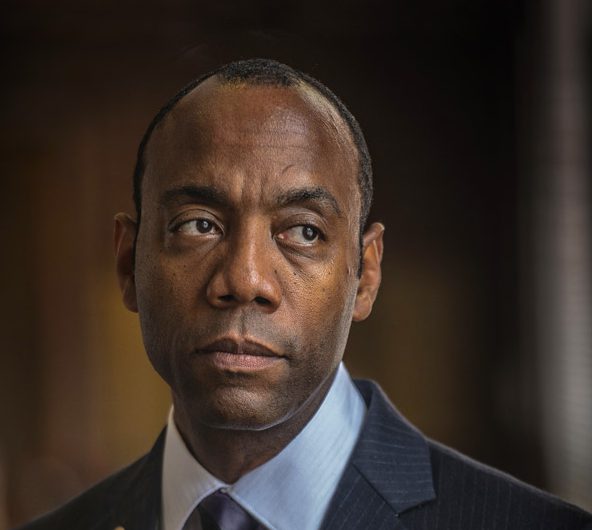
Cornell William Brooks (Photo by Bill O’Leary/The Washington Post)
NAACP National President Cornell William Brooks came to Detroit on Sunday, October 23 speaking at two of Detroit’s historic churches, Greater New Mt. Moriah Baptist Church, where Rev. Kenneth J. Flowers serves as the pastor and Fellowship Chapel, where Rev. Dr. Wendell Anthony serves as the pastor and is also Detroit Branch NAACP President. President Brooks is travelling the country encouraging citizens to Get Out and Vote for the November Presidential Election. The following are excerpted comments made at Fellowship Chapel during an interview with The Michigan Chronicle.
“There are about 17 states that we’re focusing on. These are the states that are largely in the Midwest and in the deep South where we have seen the vote suppressed and they are also states where we have seen only four years ago tremendous African American turnout. Michigan is critically important. Detroit is critically important. If Detroit and Michigan led the country, African American women led all groups in terms of voting. Only four years ago. We can’t let the nation down now. African American women and millennials elected, and then re-elected the first AA president.”
“Among millennials we see a certain skepticism about the effectiveness of the vote. So you see generationally unprecedented levels of activism, [but] you’re also seeing a certain skepticism about the vote. But it’s not that young people don’t believe, it’s that they want to believe, and they want someone and issues to believe in.”
“It’s not a matter of the two candidates at the top of the ticket, it’s a matter of you putting your name on the ballot. Your issues on the ballot. Your community concerns on the ballot. It’s not about Hillary and Trump. It’s about Jamal and Taneisha. It’s about kids in our schools. You gotta vote for them. You gotta let your community motivate you to vote.”
Concerning the competing Community Benefits Proposal A vs. Proposal B, “Detroit is really leading in this regard. So we see many communities executing project-labor agreements and community benefit agreements. I think what is interesting about Detroit is you have a community benefit agreement as a ballot initiative and that you have two of them with two different thresholds. What that says to me, maybe the difference between good and best? The fact that people have this on the ballot, it says they’re looking to harness development in terms of community advancement. For example, we’ve seen in cities like Washington and cities like Philadelphia and Newark where you see development downtown that does not extend to the neighborhoods. The fact that Detroit gets this I think is incredibly important.”
“We extended invitations to both Mr. Trump and Secretary Clinton to speak at our convention. Secretary Clinton came, spoke in depth and in detail with respect to the criminal justice challenges facing our country. Mr. Trump deigned to decline our invitation serially. We’ve not hide nor hair from him. To the extent that he has spoken on the issues of criminal justice reform, sentencing reform, policing reform, he’s used ambiguous phrases like law and order. Well he’s spoken to this same issue with the specificity of a bumper sticker. We don’t know how he feels about stop and frisk, we don’t know what he has to say about community policing, we don’t know. On the other hand, Secretary Clinton not only spoke at our convention, but she then follows up with a detailed letter a month later. Just to clarify her position.”
“To the extent that you have one candidate with a fully delineated plan, and another candidate with essentially a blank sheet of paper, that presents to the people, relative to the agenda of the NAACP, a clear choice.”